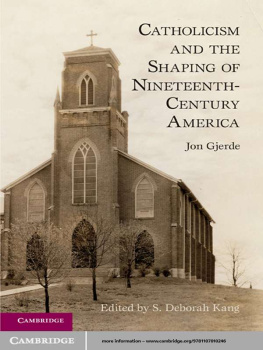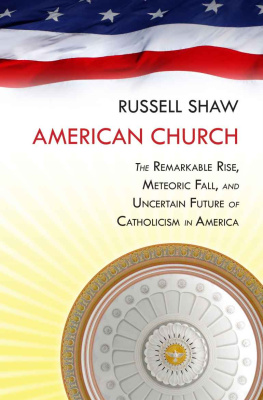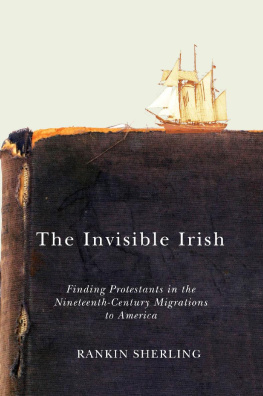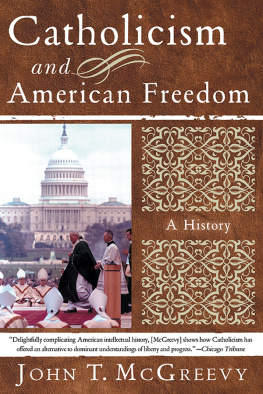Catholicism and the Shaping of Nineteenth-Century America
Catholicism and the Shaping of Nineteenth-Century America offers a series of fresh perspectives on one of the most familiar themes the nations encounter with Catholicism in nineteenth-century American history. While religious and immigration historians have construed this history in univocal terms, Jon Gjerde bridges sectarian divides by presenting Protestants and Catholics in conversation with each other. In so doing, Gjerde reveals the ways in which Americas encounter with Catholicism was much more than a story about American nativism. Nineteenth-century religious debates raised questions about the fundamental underpinnings of the American state and society: the shape of the antebellum market economy, the transformation of gender roles in the American family, and the existence of slavery in an ostensibly democratic polity were only a few of the issues engaged by Protestants and Catholics in a lively and enduring dialectic. While the question of the place of Catholics in America was left unresolved, the very debates surrounding this question generated multiple conceptions of American pluralism and American national identity.
Jon Gjerde (February 25, 1953October 26, 2008) was an American historian and the Alexander F. and May T. Morrison Professor of American History and American Citizenship at the University of California, Berkeley. At Berkeley, he also served as chair of the Department of History and dean of the Division of Social Sciences in the College of Letters and Science. He is the author of the award-winning From Peasants to Farmers: The Migration from Balestrand, Norway, to the Upper Middle West and The Minds of the West: Ethnocultural Evolution in the Rural Middle West, 18301917 .
S. Deborah Kang is an assistant professor in the Department of History at California State University, San Marcos, and a former postdoctoral scholar in the Department of History at the University of California, Berkeley. She is a specialist in the areas of American legal, western, and immigration history and the author of The Legal Construction of the Borderlands: The INS, Immigration Law, and Immigrant Rights on the U.S.-Mexico Border , which will be published in 2012.
CAMBRIDGE UNIVERSITY PRESS
Cambridge, New York, Melbourne, Madrid, Cape Town, Singapore, So Paulo, Delhi, Tokyo, Mexico City
Cambridge University Press
32 Avenue of the Americas, New York , NY 10013-2473, USA
www.cambridge.org
Information on this title: www.cambridge.org/9780521279666
Jon Gjerde 2012 Preface and Epilogue S. Deborah Kang 2012
This publication is in copyright. Subject to statutory exception and to the provisions of relevant collective licensing agreements, no reproduction of any part may take place without the written permission of Cambridge University Press.
First published 2012
Printed in the United States of America
A catalog record for this publication is available from the British Library.
Library of Congress Cataloging in Publication data
Gjerde, Jon, 19532008.
Catholicism and the shaping of nineteenth-century America / Jon Gjerde ; edited by S. Deborah Kang.
p. cm.
Includes bibliographical references and index.
ISBN 978-1-107-01024-6 (hardback) ISBN 978-0-521-27966-6 (paperback)
1. United States Church history 19th century. 2. Christianity United States
Influence. 3. United States History 19th century. 4. Catholic Church United States
History 19th century. 5. Catholic Church Relations Protestant churches. 6. Protestant
churches Relations Catholic Church. I. Kang, S. Deborah, 1970 II. Title.
BR 525.G47 2011
277.307dc22
2011009194
ISBN 978-1-107-01024-6 Hardback
ISBN 978-0-521-27966-6 Paperback
Cambridge University Press has no responsibility for the persistence or accuracy of URLs for external or third-party Internet Web sites referred to in this publication and does not guarantee that any content on such Web sites is, or will remain, accurate or appropriate.
Editors Preface
Jon Gjerde planned to both begin and end his manuscript for Catholicism and the Shaping of Nineteenth-Century America with an account of the 1844 anti-Catholic riots in Philadelphia.
Jon Gjerde, who was dean in the College of Letters and Science and the Alexander F. and May T. Morrison Professor of American History and American Citizenship at the University of California, Berkeley, unexpectedly passed away in October 2008, at the age of fifty-five. Earlier that year, he had submitted a nearly complete draft of Catholicism and the Shaping of Nineteenth-Century America to Cambridge University Press for review. All that remained to be done was the completion of a seventh and could stand on their own merits and together constituted a clear and incisive account of relations between Protestants and Catholics in the nineteenth century. Given the polished state of these chapters, only relatively minor changes have been made throughout the text and footnotes. I have kept intact the sections of the manuscript that foreshadow the argument Gjerde planned to make in Chapter 7, which would have illustrated the relationship between religion and politics in nineteenth-century America. I have also retained Gjerdes direct references to Chapter 7 in the Introduction where they assist the reader in understanding the scope and organization of his narrative. An epilogue, drawing on Gjerdes drafts and notes, has been added to suggest the connections between Catholicism and the Shaping of Nineteenth-Century America and the religious debates of the present day. Finally, this preface has been written for the benefit of historians of immigration and religion to address the question of why Gjerde, an esteemed immigration historian, chose to write about religious history and to explain how his multidisciplinary perspective illuminated his study of Protestants and Catholics in nineteenth-century America.
In Catholicism and the Shaping of Nineteenth-Century America , Jon Gjerde aimed to recapture what he referred to as the lost moments in the history of American anti-Catholicism. For Gjerde, the emphasis on the reactionary elements of anti-Catholicism and nativism in nineteenth-century America had drawn scholarly attention away from the breadth and depth of the relationship between Catholics and Protestants during that period. The tensions in that relationship found expression not only in sporadic violence but also in a lasting debate over some of the most pressing issues of the day, including the shape of the antebellum market economy, the transformation of gender roles in the American family, and the place of slavery in an ostensibly democratic polity. For both Catholics and Protestants, the stakes were high; each group believed that the very fate of the nation its economy, society, and political institutions rested on the spiritual character of its citizens. In other words, for both Catholics and Protestants, religion constituted a critical factor in the development of the nation in the nineteenth century.
Catholicism and the Shaping of Nineteenth-Century America , then, recasts the history of anti-Catholicism as a broad story about how a religious conflict built a nation. As Gjerde explains, the unprecedented increase in Catholic migration from Europe to the United States compelled the nation to address the problem of how to incorporate diverse religious groups into American society. Parochial schools, convents, and theological seminaries were the primary institutions designed to maintain and expand Catholicism in America.







